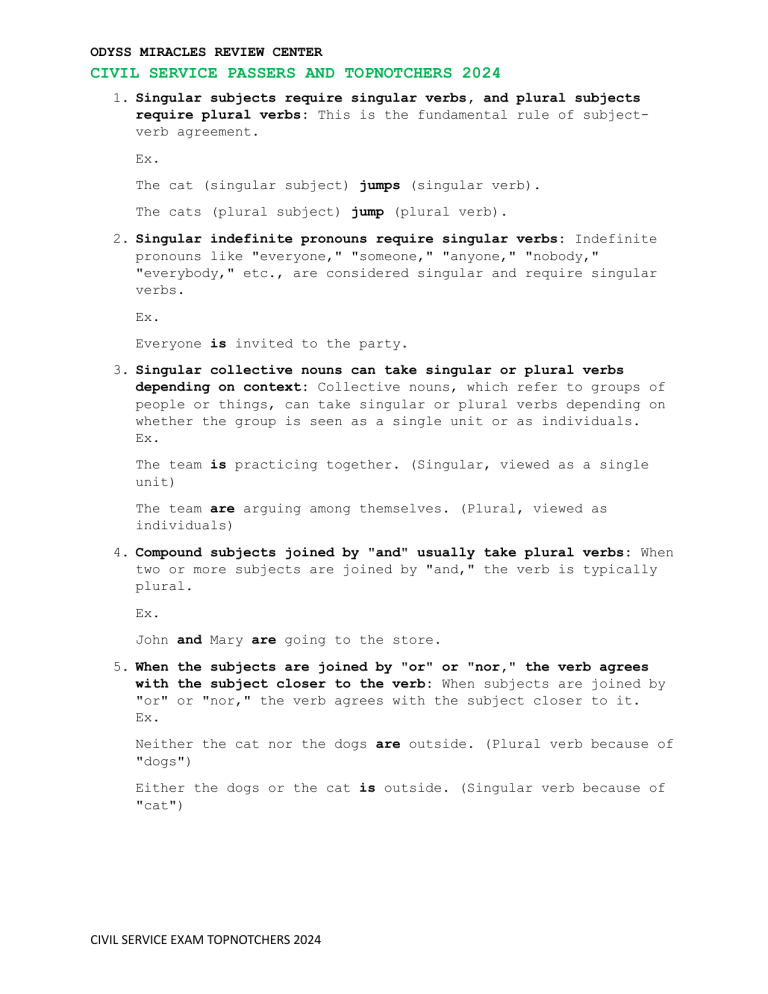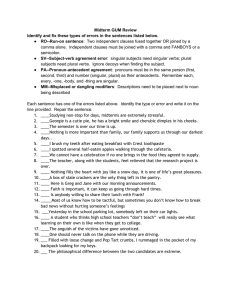
ODYSS MIRACLES REVIEW CENTER CIVIL SERVICE PASSERS AND TOPNOTCHERS 2024 1. Singular subjects require singular verbs, and plural subjects require plural verbs: This is the fundamental rule of subjectverb agreement. Ex. The cat (singular subject) jumps (singular verb). The cats (plural subject) jump (plural verb). 2. Singular indefinite pronouns require singular verbs: Indefinite pronouns like "everyone," "someone," "anyone," "nobody," "everybody," etc., are considered singular and require singular verbs. Ex. Everyone is invited to the party. 3. Singular collective nouns can take singular or plural verbs depending on context: Collective nouns, which refer to groups of people or things, can take singular or plural verbs depending on whether the group is seen as a single unit or as individuals. Ex. The team is practicing together. (Singular, viewed as a single unit) The team are arguing among themselves. (Plural, viewed as individuals) 4. Compound subjects joined by "and" usually take plural verbs: When two or more subjects are joined by "and," the verb is typically plural. Ex. John and Mary are going to the store. 5. When the subjects are joined by "or" or "nor," the verb agrees with the subject closer to the verb: When subjects are joined by "or" or "nor," the verb agrees with the subject closer to it. Ex. Neither the cat nor the dogs are outside. (Plural verb because of "dogs") Either the dogs or the cat is outside. (Singular verb because of "cat") CIVIL SERVICE EXAM TOPNOTCHERS 2024 ODYSS MIRACLES REVIEW CENTER CIVIL SERVICE PASSERS AND TOPNOTCHERS 2024 6. Singular subjects connected by "or" or "nor" require a singular verb: If both subjects are singular and connected by "or" or "nor," the verb should be singular. Ex. Either pizza or salad is fine for dinner. 7. Indefinite pronouns like "each," "every," "everyone," "nobody," etc., are singular and require singular verbs: Ex. Each of the students has a book. 8. Subjects preceded by "one of" or "each of" are singular: Even though these phrases refer to multiple items, the subject is considered singular, and the verb should be singular. Ex. Each of the books is interesting. 9. Subjects preceded by "a number of" or "a majority of" are plural: Despite the presence of "a number of" or "a majority of," the subject is plural, and the verb should be plural. Ex. A number of students are waiting for the bus. 10. Subjects followed by "plus," "minus," "together with," "as well as," etc., do not affect the number of the subject: The verb agrees with the original subject. Ex. The teacher, together with her students, is attending the conference. 11. Subjects that represent amounts of time, money, distance, weight, etc., are singular: Even though these subjects may represent multiple individual items, they are treated as singular. Ex. Ten dollars is a fair price. CIVIL SERVICE EXAM TOPNOTCHERS 2024



